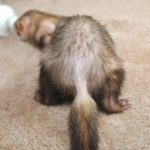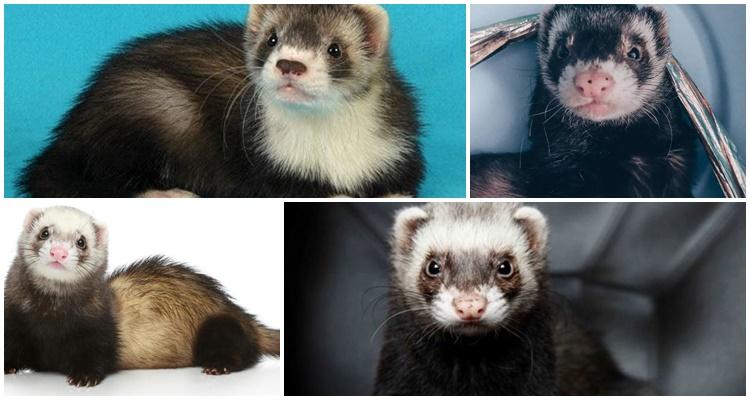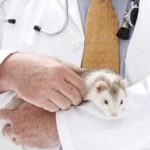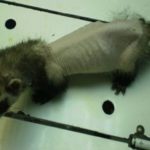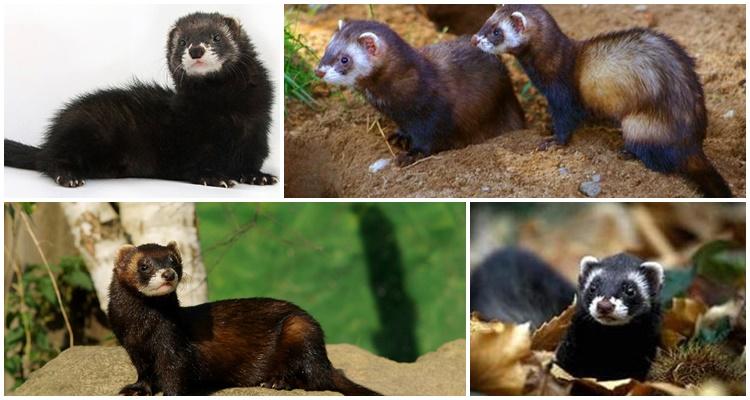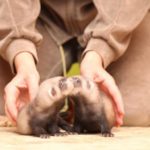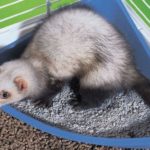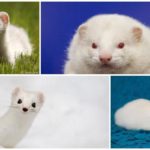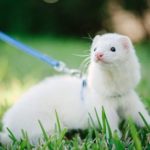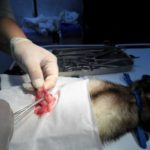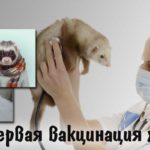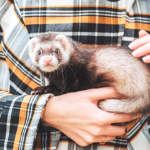Ferrets are still exotic pets, and some owners do not always know how to solve problems that may arise when keeping them. For example, animals may experience severe hair loss and a peeling tail. Let's look at the reasons why ferrets' tails go bald and how to deal with this problem. What preventive measures exist and when should you contact a veterinarian?
Why does a ferret's tail go bald?
There can be many reasons for hair loss in ferrets.These are both natural causes and pathologies that have developed in the animal due to improper feeding or poor care.
Natural shedding
Ferrets' fur changes twice a year - during the changing seasons. The change of coat begins with the tail, after a few days a new one grows on it. In winter, the tail and body of the animal are covered with thick fur; in summer, the hair is sparse.
Also, this type of predator may have a phenomenon called alopecia areata. In the spring, with the transition to summer fur, the tail may come off due to natural reasons. This is the normal state of the animal in a hot, dry climate. In autumn, with the onset of cold weather, the tail will again be covered with thick hair.
Clogged pores
The hair on the tail of ferrets will fall out due to contamination of the skin pores, which can occur due to the animal's uncleanliness or due to hormonal imbalance during pregnancy or when in heat.
Black or brownish dots on the skin of the tail are clogged pores. To prevent the fur from falling out, the animal must be bathed with a special pet shampoo. If you don’t have it, you can use baby soap, apply the paste to the tail, rub with a soft toothbrush and rinse with warm water.
Stress
Hair loss can be a consequence of severe stress or melancholy of the animal. Ferrets are active, mobile, inquisitive animals. If your pet sits in a crate all the time, its emotional and physical condition will worsen. The causes of stress can be moving to a new place, a change in owner, living conditions, noise and unpleasant odor, which the animal is forced to feel most of the time.The ferret, as a burrowing animal, must live in a shelter; he needs to build a small house - warm, dark, with a soft floor.
Wrong diet
The quality of ferrets' fur depends directly on what they eat. The predator's body must receive proteins, fats, and vitamins. A lack of vitamins B and H, that is, hypovitaminosis, is a common reason why a ferret’s tail begins to go bald. With a lack of biotin, which develops in an animal when it is frequently fed raw eggs, a disease develops with inflammation of the skin, itching, seborrhea, splitting and hair loss. To achieve a balance of vitamins in the pet’s body, it is fed preparations containing artificial biotin or given kidneys and liver, which contain a lot of this substance.
IN diet of a domestic ferret the first place should be raw meat, as well as dairy products, eggs, some cereals and vegetables. They should not be given table food, salted, smoked or fried meat. All unsuitable food deteriorates the quality of the coat.
In addition to natural food, ferrets can be fed with special dry food, but it is important to choose high-quality and inexpensive food, the ingredients of which will be well selected and the nutrients will be balanced.
Parasites
If an animal often itches and bites its fur, this is a clear sign that it has parasites - fleas and lice. If this behavior occurs, you need to examine the ferret and treat it with insecticidal veterinary agents. Preventive treatment should be carried out 2 times a year.
Disease
Skin diseases, such as eczema and dermatitis, cause baldness in ferrets. The animal also loses its fur due to endocrine diseases. Before starting treatment, you need to establish a diagnosis, which your veterinarian will help with.
Adrenal damage
Loss of hair covering the tail may indicate disease in these organs. The tail is followed by the back and head of the animal. At ferret adrenal disease becomes aggressive, feels pain when urinating. The cause of hair loss is the excessive production of estrogen during the disease, causing the fur to fall out. If there is a suspicion of damage to the adrenal glands, you need to take the animal to the veterinarian. There is no self-cure for this disease; in advanced cases, the animal will die.
Ticks
Sarcoptes mites can infect ferrets when walking outdoors, especially during the summer breeding season. An infected ferret itches, its skin peels and becomes crusty. With severe damage, appetite and physical activity decrease. Ticks are destroyed by treating the animal with Ivomek.
Tumors
Neoplasms on internal organs, for example, on the adrenal glands and skin, can lead to baldness. In this case, only a veterinarian can make the correct diagnosis and select treatment.
Mycoses
These are fungal skin diseases that lead to permanent fur loss. Without treatment, the fungus can spread to the entire body of the animal. The skin at the site of the lesion is red, inflamed, dry and flaky. The animal combs it, leaving scratches from its claws.
How to deal with the problem
If the problem is not serious, you can solve it yourself. If the cause of your ferret's baldness is improper care, then you need to take action: bathe the animal 1-2 times a month, using special shampoos. If the problem is poor nutrition, correct it: review the diet and bring it back to normal in accordance with the requirements of the animal’s physiology.Additionally, you need to give your pet vitamins and mineral supplements.
If the cause of baldness is the animal’s stress, its source must be eliminated. Provide the animal with sufficient physical activity - you need to take it for a walk outside or at least let it out of the cage to run around in the room. It is necessary to ensure that the room has a suitable air temperature and humidity so that the animal’s skin does not dry out. Treat a pet infected with parasites with antiparasitic agents until the insects are completely destroyed.
Preventive actions
Prevention of hair loss from the ferret's tail and body consists of maintaining cleanliness in the cage and room where he spends time. In caring for the animal's fur - combing and bathing. In feeding with food from which the predator’s body can obtain all the substances it needs for the proper functioning of its organs.
Despite their lively disposition, ferrets are sensitive to stress factors, so you need to protect them as much as possible from everything that can irritate and nervous them. You need to spend more time communicating with your animal and walking with it. If time is short, you can get a cat or dog with which ferrets develop a good relationship.
In what cases should you contact a veterinarian?
Veterinary care for a ferret is necessary for diseases of the adrenal glands, tumors, endocrine diseases, eczema, and dermatitis. It is problematic to cure them on your own, without special knowledge. For serious diseases of the skin and internal organs, consult a veterinarian first; self-treatment may cause harm rather than benefit. When the diagnosis is established, you need to strictly adhere to the doctor’s recommendations, give the animal the prescribed medications, and do not stop treatment until the pet recovers.
The causes of baldness of a ferret's tail can be due to various factors. In addition to natural shedding, which occurs twice a year at a certain time, hair falls out due to diseases and improper care and feeding. In almost all cases, responsibility for this lies with the ferret's owner. Most problems can be prevented if you monitor the animal’s condition, its behavior, and examine its fur in order to identify problems in the early stages. In such cases, treatment will not take much time and will not be tiring for the animal and its owner.


